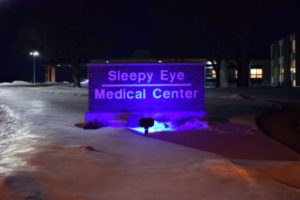 Sleepy Eye Medical Center, along with over 60 other civic, public and private organizations across the state, are banding together to turn Minnesota blue in March; the month governor Mark Dayton officially proclaimed as Colorectal Cancer Awareness Month in the State of Minnesota.
Sleepy Eye Medical Center, along with over 60 other civic, public and private organizations across the state, are banding together to turn Minnesota blue in March; the month governor Mark Dayton officially proclaimed as Colorectal Cancer Awareness Month in the State of Minnesota.
The entire month of March, SEMC will shine blue from dusk to dawn to show support for colon cancer survivors and patients, while raising awareness about the importance of screening. In addition, many SEMC employees wore blue as well as special stickers on March 5 to spark conversations with patients about the disease. SEMC intends these efforts to bring attention to the nation’s second leading cause of cancer deaths for men and women in the United States.
The Colon Cancer Coalition recommends screening starting at age 50. What many don’t realize is earlier screening is recommended for individuals with a family history.
“Starting screening at age 50, or earlier for those with a family history, is incredibly important. At SEMC, we offer screening with colonoscopy, FIT (fecal immunochemical test), and stool DNA testing. All have their own benefits and drawbacks,” said Dr. Adam Armbruster, SEMC. “Colonoscopy is a unique screening test in that it not only aids in early detection of cancer, but can actually prevent some cancers from developing.”
According to the Coalition, one in 20 Americans will be diagnosed with colon cancer in their lifetime, and one in 10 of these individuals will be diagnosed under the age of 50. In Minnesota, approximately 72% of the eligible adult population has been screened for colorectal cancer. Increasing this number by just one percent means an additional 10,000 Minnesotans would be screened for this preventable cancer, saving lives in the process.
Reduce Your Risk of Colon Cancer
The Colon Cancer Coalition recommends individuals take the following measures to reduce the risk of colon cancer:
- Get screened as recommended, starting at age 50, or earlier for those with certain risk factors.
- Maintain a healthy weight, and adopt a physically active lifestyle.
- Understand the symptoms, and talk with your doctor if you experience blood in your stool, chronic constipation or unexplained weight loss.
- Consume a healthy diet of fruits, vegetables, and whole grains, while limiting consumption of red and processed meats.
- Limit your alcohol consumption and don’t smoke.
For additional resources and information about colon cancer, visit https://coloncancercoalition.org/.